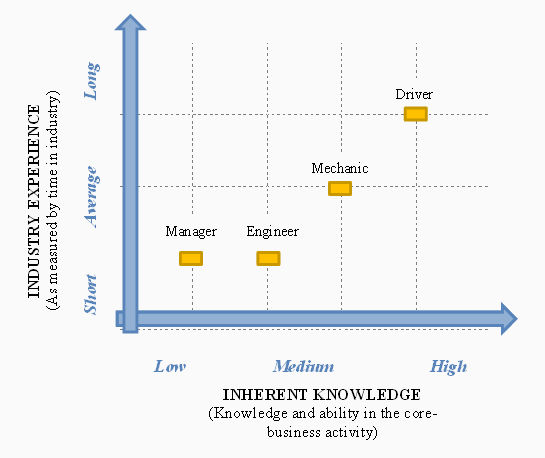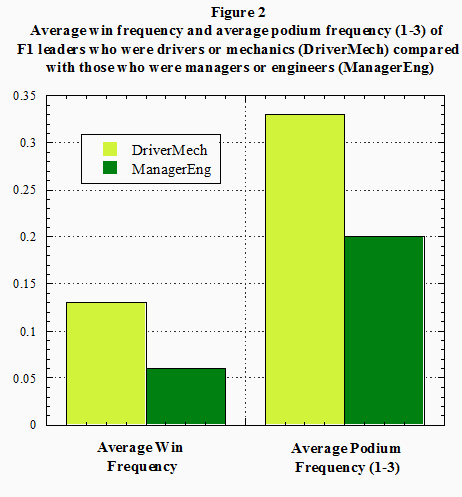Should a boss have worked on the shop floor? This gets to the question of how much business knowledge leaders should have about the organisations they are to lead. There has been a trend in recent years to promote into leadership positions individuals who are skilled managers, but who do not necessarily have either a background in the sector concerned, or hands-on experience of the core business activity. Similarly, there is recent evidence that major firms have moved away from hiring CEOs with technical expertise, towards instead the selection of leaders who are generalists (Frydman 2007; Bertrand 2009).
Several studies argue that as well as managerial skills (such as the ability to set standards, distribute tasks, and initiate performance discussions), it is technical competence (such as knowledge and skills specifically related to the industry of leader’s employment) that increases organisational performance (e.g. Andrews and Farris 1967; Barnowe 1975; Goodall 2006, 2009, 2012).
Expert leaders vs. managers
We try to get to the ‘expert leader versus manager’ question by first isolating different leader characteristics, and then by trying to identify which kinds of leaders are most successful over time. We collect and analyse six decades of field data from the highly competitive industry of Formula One World Constructors’ Championship, in which each organisation's performance can be measured objectively. Our dataset includes information on every car of each constructor team (e.g. Ferrari, Red Bull, McLaren) in every F1 race between 1950 and 2011. We also collect background information on leaders of all F1 constructor teams for the same time period. We identify four groups of leaders according to their background characteristics: drivers, managers, mechanics, and engineers (with degrees).
In F1, each constructor team competes to win the championship by entering two cars in consecutive races every year. The goal of a constructor team is to maximise the number of points gained in races. Points are awarded based on the final position of each car at the end of the race (the first car wins the largest number of points, with other race points assigned down to tenth position). Constructor teams are relatively homogeneous and identical criteria are applied to measure their performance.
Leaders of constructor teams in F1 operate in a skilled and stressful environment which requires quick decision making. The team principal is responsible for the day-to-day running of the team. Some leaders, for example Frank Williams of Williams or Tony Fernandes of Team Lotus, own and run their own teams. Owner-leaders have extensive powers. In other cases, principals are hired by owners to manage their teams. Such is the relationship between the beverage company Red Bull and principal Christian Horner. The role of team leader will differ; however, the kinds of decisions made by principals include choosing drivers, having the final word on technical issues such as how the car is set up, pit strategy, which gearbox or engine is used, and financial decision making, for example, about sponsorship or team wages.
Expert leadership in Formula One
In our research we concentrate on two components of leadership ability: what we call inherent knowledge, which might be thought of as hands-on expertise, and the second component is industry experience. We first identify a leader’s depth of knowledge and related expertise, and then test whether these characteristics are correlated with organisational performance. The simple matrix in Figure 1 represents the relative positioning of the four leader types in our study -- drivers, managers, mechanics, or engineers (with degrees) -- according to our criteria of inherent knowledge and industry experience.
Figure 1. Inherent knowledge and industry-related experience in Formula 1 team leaders
Manager refers to a leader with low or basic inherent knowledge and minimal industry experience. Often manager-leaders are successful businessmen or CEOs who move to F1 from a different (and often unrelated) industry. Driver is assigned to leaders with high inherent knowledge and long industry experience. Driver-leaders have been involved in competitive racing (F1 and other racing competitions) as drivers from a very early age. A mechanic is a leader with medium inherent knowledge and average industry experience. Mechanics have practical technical experience in car making and mechanical repair but have not driven competitively and have not obtained a degree in mechanical engineering or a related field. Finally, engineer depicts a leader with low inherent knowledge of the core business activity and short industry experience. Engineers are highly skilled professionals and are defined in our study as those with degrees in mechanical engineering.
Who makes the best F1 team leaders?
To explore whether constructor teams’ performance in F1 depends on leaders’ types it is interesting to look first at the raw patterns in the data. These reveal that podium frequency (i.e. winning a first, second or third place in a race) and average wins frequency (i.e. coming first in a race) are more prevalent among teams headed by drivers and mechanics as compared with managers or engineers (see Figure 2). Drivers and mechanics also have higher average pole frequencies (finishing first in the qualifying, and, as a result, starting the race at the very front of the grid) and average fastest lap (showing the fastest time in the race on any given lap). Former drivers and mechanics win twice as often as other kinds of F1 leaders.
Figure 2. Average win and podium frequencies under different leaders
Next we use econometric methods which include multiple control variables, for example, type of race circuit, the fame of the constructor team, the year of the race, and the number of cars in each competition. In each of the regressions, the dependent variable is a measure of the performance of the team based on the final position of each car in every race. The key explanatory variable is a leader’s classification (i.e. manager, driver, mechanic or engineer). The regressions reveal that constructor teams led by drivers and mechanics are more successful than teams headed by managers and engineers. In other words better F1 team performance is associated with leaders who have high inherent knowledge of the core business and longer industry experience.
The core business activity in F1 is driving. So our final task is to find out whether the amount of driving experience makes a difference. To do this we identify those principals who have had competitive driving experience. The results show that time spent as a driver has a big effect on future performance as a leader. To give a feel for the size of effects, it is helpful to consider what happens when a leader has ten years of experience instead of zero years. This is associated with a 16 percentage point higher probability of the leader’s team gaining a podium position – after controlling for circuit, race year, constructors and number of cars qualified. The extra probability of gaining a podium position when a driver has had a decade’s experience of competitive racing is about one in seven.
Why might former drivers and mechanics make better F1 leaders?
Our central proposition is that leaders with inherent knowledge of the core business activity, combined with extensive industry experience are associated with better organisational outcomes. Our results support this. We have established that there is a strong association between having been a driver or mechanic and winning in F1, as compared with leaders who were principally managers or engineers (with degrees). Second, we found that the more years spent as a racing driver, the better the results for those who later become team heads.
Former drivers and mechanics may become better leaders because they are familiar with all aspects of Formula 1. From an early age driver- and mechanic-leaders develop technical knowledge about the underlying activity of Grand Prix racing. This may mean that they acquire extensive experience in formulating driving tactics and combine it with a good understanding of mechanics. Former drivers and mechanics may command more respect because of their proven track record; they may also be viewed as more credible since they have ‘walked the walk’. Having been ‘one of them’ may signal that a leader understands the culture and value system, incentives and motivations of their F1 team colleagues. In addition, we might expect driver-leaders to act as role models within the team, and, be more likely to coax high performance and to manage the egos of the drivers. Finally, leaders with high levels of expertise and experience may communicate more effectively with any part of the racing team (Pogrebna et al. 2011) which is likely to support team strategy.
Inherent knowledge of the core business cannot be a proxy for management and leadership ability. As might be presumed, leaders should be selected based on their management skills as well as on technical expertise (Mumford 2000). However, the evidence in our study suggests that in contrast to recent corporate trends to hire generalists as leaders, being a manager alone is not sufficient. Managers performed the least well as F1 team leaders.
Leadership is a loaded topic and it is sometimes hard for observers to suspend a natural desire to rely on anecdotes. Based on the evidence in our study, we argue for an ‘expert leader’ model of effective leadership, incorporating a combination of inherent knowledge and industry experience.
References
Andrews, F M, & G F Farris (1967), "Supervisory practices and innovation in scientific teams", Personnel Psychology, 20, 497–515.
Barnowe, J T (1975), "Leadership and performance outcomes in research organizations", Organizational Behavior and Human Performance, 14, 264–280.
Bertrand, M (2009), "CEOs", Annual Review of Economics, 1:1.1–1.29.
Frydman, C (2007), "Rising through the ranks: The evolution of the market for corporate executives", 1936-2003. Journal of Economic History, 66 (2): 516-517.
Goodall, A H (2006), "Should top universities be led by top researchers, and are they?" Journal of Documentation, 62, 388-411.
Goodall, A H (2009), Socrates in the boardroom: Why research universities should be led by top scholars, Princeton and Oxford: Princeton University Press.
Goodall, A H (2012), "Theory of Expert Leaders", IZA Working Paper 6566, May 2012.
Mumford, M D, M A Marks, M S Connelly, S J Zaccaro and R Reiter-Palmon (2000), "Development of leadership skills: experience, timing, and growth", Leadership Quarterly, 11, 87–114.
Pogrebna, G, D Krantz, C Schade, and C Keser (2011). "Words versus actions as a means to influence cooperation in social dilemma situations", Theory and Decision, forthcoming.




